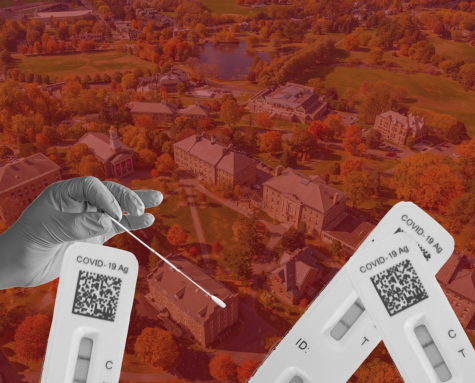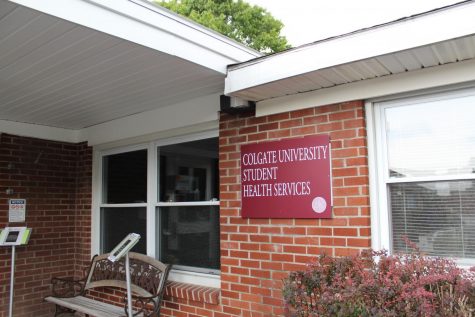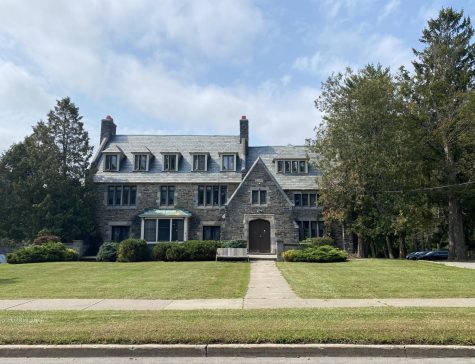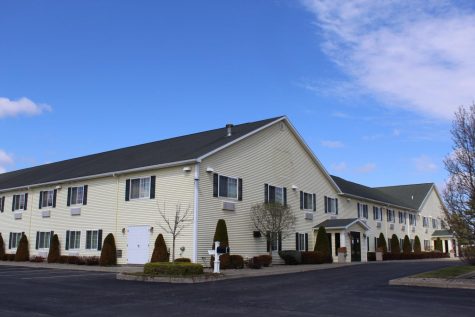Off Campus Seniors Frustrated With Guidance on Arrival and Quarantine
Many seniors approved to live off campus lease apartments or houses in and around Downtown Hamilton.
Seniors living in privately owned off-campus housing in the fall said they were caught off guard by communication they received from Colgate on Monday, Aug. 3 outlining their move-in and quarantine restrictions, taking swift action in contacting administration and creating a Change.org petition expressing their concerns. According to the email from Vice President and Dean of the College Paul McLoughlin, off-campus students would not be able to move into their privately-owned housing when their leases begin and will be required to comply with the move-in schedules for the rest of upperclassmen students, arriving on Aug. 24 or 25. While these regulations are consistent with the return to campus guide and subsequent communication to the entire student body the week prior, off-campus students say the earlier communication did not explicitly outline how the move in and quarantine procedures applied to them.
Among other details, McLouglin’s email outlines that early arrival is not permitted for off-campus seniors, citing the testing schedule that would not allow adequate time for pre-arrival tests to be processed and the results received for students to arrive early, as well as the logistics of testing upon arrival to Hamilton.
“We are simply unable to do baseline testing earlier than as outlined in this schedule — a testing regime that Colgate’s reopening plan requires,” McLoughlin said. “The main point of my message is that all of the expectations for students on campus also apply to students living within the Village of Hamilton and surrounding areas.”
Senior Kobi Grant created a Change.org petition to members of administration after last Monday’s email outlining off-campus students’ concerns. The petition expressed frustration that the earlier guidance released failed to address move-in and other details for off–campus students and that the communication they received nearly a week later did not allow adequate time for students and their families to change their plans. According to Grant, many seniors planned to move in upon the start of their leases before formal move in for students on campus — which has been allowed in previous years — and signed the Commitment to Community Health under this assumption.
“Our families were caught incredibly off-guard by [last Monday’s] information restricting when we are allowed to move in,” Grant wrote in the petition. “Especially in these times, the jobs of our families are incredibly important; they cannot drop everything to drive up to campus.”
In response to similar concerns at the University town hall for off campus students and families on Thursday, Aug. 6, McLoughlin asserted that the regulations on the universal quarantine and move-in provided in the prior guidance, while not specifically referencing off campus students, did apply to all students, saying that the communication specifically to off-campus students was a clarification that the move-in dates, procedures and universal quarantine applied to off-campus students as well.
Along with move-in logistics, Grant’s petition also requested that administration deliver meals to students off campus or provide other means for food access and allow off-campus students to move in allowed by their leases or Aug. 21 and 22, before the rest of the student body arrives on campus. It also requested administration allow off-campus students to go to the grocery store upon their arrival to campus before starting their quarantine. Per New York state law, however, any student arriving from the 34 states, D.C. and Puerto Rico on New York’s travel advisory are required to quarantine for 14 days immediately and are restricted from going into any businesses during the state-mandated quarantine, and those living in the same family unit as someone from any of these states are also subject to these guidelines. According to last week’s email announcing the universal mandatory quarantine from President Brian Casey and McLoughlin, over half of the student body falls under New York’s quarantine mandate and, although some students may not be from advisory states, many will be residing or in close contact with those who are.
Senior Ehran Hodes, who helped draft the petition along with Grant and seniors Graham Russell and Nick Diebold, spoke to President Casey last Tuesday after personally reaching out to members of the administration with his concerns and the petition. Hodes said he was pleased by how quickly Casey and McLoughlin responded, yet only received closure on one petition’s demands.
“[Casey] showed that he really would try by how clear and energetic he was about communicating with me,” Hodes said. “He clarified that the school will figure out a way to get off-campus students groceries.”
Grant, who said getting safe access to food and groceries is his top priority, called the administration’s commitment to secure grocery delivery access a good step forward in addressing students’ concerns.
“They were suggesting for us to bring 10 days worth of groceries, including the stuff we’re traveling with, all our clothes, all our belongings that we’re gonna have for our rooms to live off campus. That’s really ridiculous,” Grant said.
Since the release of guidance by administration, local businesses including Parry’s General Store and Hamilton Whole Foods have announced grocery and other product delivery options directly to on and off-campus student residences. Instacart, a nationwide grocery delivery and pickup service, is now available in Hamilton with delivery from Price Chopper and Big Lots. In addition to delivery services, Hamilton’s Partnership for Community Development and the Hamilton Businesses Alliance partnered with the University to create a resource with contactless pickup options from Hamilton businesses for students and families to utilize prior to moving in.
In regards to move-in, Hodes said Casey explained that part of the administration’s concern with early move-in is the potential for parties in off-campus residences—flagrant violations of the commitment to community health. Hodes expressed that the desire for early move-in does not stem from recklessness.
“As far as I know, and as far as the people I’ve talked to know, this simply is nowhere close to the case. Our reasoning for moving in closer to the start of our leases is clearly outlined in the petition: the information in [last] Monday’s email was not explicitly communicated in the prior announcement last week that talked about moving in. As such, families and parents made plans, booked flights [and] took time off from work,” Hodes said.
During last Thursday’s town hall and live Q&A for off-campus seniors, students voiced concerns that those on Colgate meal plans would still be paying out of pocket for their food during quarantine. McLoughlin clarified that only students on the Premier Gold (unlimited) meal plan will have their quarantine meals included, while students living on campus with the Block Plan or the 8 and 10 meal/week plans, more common for upperclassmen, will be charged for quarantine meals on top of the cost of their limited meal plans unless they choose to opt-out.
Administrators at the town hall explained that delivering dining services meals to all off-campus residences would add an estimated 70 stops on the meal drop-off and, with Colgate staff not able to enter private residences and leave meals in common rooms, would be logistically near-impossible. While Hodes and Grant say they understand the logistical difficulties for administration, common concerns are that off-campus students are expected to follow the same procedures as on-campus students without the same support.
“[Administration] cannot insist on off-campus students following the exact same guidelines as all other students if they fail to provide us with the same accommodations,” the petition says.
“Off-campus students are getting brushed aside a bit here,” Hodes added. “ Of course we must follow all the same guidelines as everyone…We are the ones that need to lead by example. Yet, the University administration needed to figure this stuff out sooner.”
Casey emphasized that the strict move-in and quarantine guidelines for off-campus students illustrate the importance of their conduct to the success of the plan during the town hall, saying it will play a chief role in determining if campus must re-close mid-semester.
“We’re going to look at a number of factors — infection rates, use of PPE, adherence to testing protocols to see where we stand — but perception about how this plan is going might be the most important factor we’ll be dealing with. Does the village, our faculty, do the local schools believe we’re doing everything we can to ensure the safety of this village? It is going to be the thing on everyone’s mind,” Casey said. “Whether it’s fair or not, they’re going to be looking at the students in the village.”

Kirby Goodman is a senior from Minneapolis, Minnesota concentrating in peace and conflict studies with a minor in political science. She's previously served as...












Jane Welsh • Aug 17, 2020 at 7:00 am
And so it begins….
While I sympathise with some of the points that the off-campus students are making, the initial mistake was to permit any off-campus living during this period.